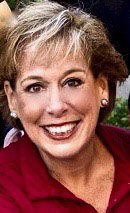ODENTON, Md. — In the 90-minute round trip between her home outside Baltimore, where she was born and raised, and Piney Orchard Ice Arena, in Odenton, Maryland, Robyn Remick has time to think.
She weighs the responsibility of turning the Maryland Black Bears into central Maryland’s “hometown” hockey team.
“The beauty of a long commute is that it allows you to really reflect on, ‘What did I do well today?’ I’m beyond the point in my career where I need accolades,” said Remick, 57, who lives in Reisterstown, Maryland, with her husband, Allan, and daughter Emily.
After a 35-year career in sales and marketing in which she lived all across the country working for companies including Disney and ESPN, Remick was hired in October as president of the Tier II junior hockey team, becoming the first female president in the North American Hockey League’s 24-year history.

“She could have taken much bigger jobs,” said Murry Gunty, the Maryland Black Bears’ owner. He said he saw a kindred spirit in Remick — an innovator willing to consider any idea (within reason) to sell a vision to a hockey fan base that already exists in Maryland. “She is qualified to run a professional team.”
On game nights, Remick can be found at the front door of the arena, greeting the roughly 300 fans who attend each home contest.
“I welcome every single fan who comes in, and I tell them ‘Thank you for coming’ when they leave,” she said. “That is part of the Disney culture, which is, ‘Welcome; we are happy you here.’ You can’t ever take that for granted and I never will.”
Remick often hands out her business card and answers late-night texts from the billet families scattered across the area who host hockey players at their homes. She has been “passionate” about communicating with and sharing her appreciation for those families, said billet coordinator Amanda Hafler.
“It makes it a lot easier being a billet when you have that support,” said Hafler, who hosts Luke Mountain, a forward from Minnesota.
“She goes above and beyond when it comes to the players,” said head coach Clint Mylymok. “She’s highly available for all of us (and) very aware of what we’re trying to do here.”
Gunty marveled at such details when he met Remick last year and invited her to a home game. She immediately began walking around the rink taking notes.
“Those are the best leaders,” Gunty said. “Whatever we accomplished today is old news. How do we keep making it better? How do you keep moving forward?”
Remick’s sharp eye for entrepreneurial opportunities was honed at ESPN, where she served in four executive positions for 12 years before leaving in 2016.
“You could say, ‘You know what would be cool? If we did this,’ and two weeks later it would be on the air. That does not happen pretty much anywhere,” she said.
Working at the popular sports network came with its share of struggles, though. “It is a testosterone-filled environment that makes it twice as hard for a woman to be heard and to be accepted. It’s not like you have to act like a guy, but you have to know your stuff.”
Since joining the Black Bears, Remick has faced similar challenges — like being mistaken for Gunty’s wife, something she brushed off as being “part of what happens when you are a female president of the company.”
These kinds of interactions seem to not bother her and have never hindered what she calls her “need to succeed.” Whether it was working three jobs to graduate with a degree in journalism from the University of Maryland in 1983 or selling MTV packages to pious Mississippians who called the channel a “force of evil,” she never took no for an answer. Remick sees herself as an example for the next generation of sports executives, regardless of their gender.
Gunty owns more than 20 companies, many of which have female executives, and said, “I just go for the best person, whoever that is. I hope that there comes a time in our country when everybody looks at it like that.”
Remick said she has had to recalibrate her expectations somewhat. She had a staff of 30 or more at ESPN; now she oversees three people. Before a recent game, Remick and an intern ventured out into several inches of snow to post yard signs.
“It had to be done,” she said. “I can’t call in my people to do that.”
Though she may not have the kind of budget she used to, Remick still has grand plans, such as installing a center-ice scoreboard and hosting a military appreciation night to keep fans coming back and represent the community, which sits in the shadow of Fort Meade.
“We want the team to reflect this area and that’s service to country, service to each other,” she said. That includes the Black Bears players: “We want every player who comes into this organization to leave here better than we got them. And that’s more than on the ice. I want them to be better men.”






